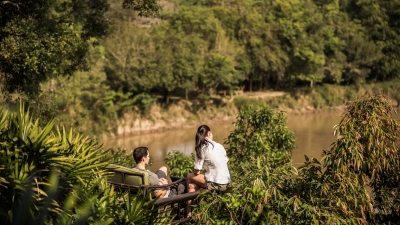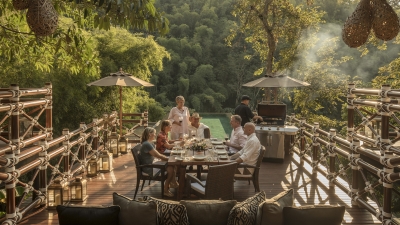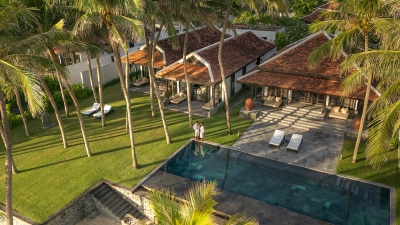Sustaining a Legacy: Mindful Luxury at Four Seasons Resorts Thailand
The resorts renew their commitment to building upon the company’s strong history of supporting its communities and the environment
From island beaches and jungled hillsides to tranquil rice paddies, Four Seasons Resorts Thailand invites guests to engage in meaningful ways with the destination and nature across three extraordinary landscapes in the “land of smiles.” Through Four Seasons for Good, Four Seasons seeks to preserve and regenerate the beautiful places in which it operates, and leave a positive, enduring impact on its communities. “The Four Seasons for Good program is centred around two pillars: Planet (environmental impact) and People (social impact),” shares Sean Mosher, General Manager, Four Seasons Resort Chiang Mai and Tented Camp Golden Triangle. “Each pillar is supported by specific activities and objectives, with a close eye to how our efforts will contribute to the community and impact the environment we operate in,” adds Jasjit Assi, General Manager, Four Seasons Resort Koh Samui. Whether it is nurturing the soil through zero-waste composting, sourcing sustainable ingredients, or weaving local craft into daily experiences, each resort reflects a deep respect for its setting—proving that sustainability and luxury can be not only compatible but also mutually enriching.
Seaside Serenity Meets Sustainability
Along the lush tropical hillside of Koh Samui, the architecture bends to nature’s will, preserving 856 coconut trees and transforming a former orchard into a thriving, low-impact retreat. Here, the landscape is the legacy as the all-pool villas and spacious private residences overlook the infinite azure blue waters of the Gulf of Thailand. “Nature’s beauty presents itself in all its glory at our resort,” says Jasjit, adding that not a single tree was felled during construction. “Instead, the villas were designed around the existing terrain.” Today, the resort produces compost daily by chipping coconut shells, branches, and food waste—supporting vibrant gardens and returning enriched soil to local farms. “Guests discover our legacy in every detail: from coconut-shell carved décor to spa treatments using coconut oil sourced from local farms,” smiles Thada Whasagool, Sustainability Manager. The biodiversity support program in partnership with Thailand’s Department of Marine and Coastal Resources, including the Coral Conservation Project, is led by the resort’s in-house marine biologist, focused on conserving the reef that skirts the resort. “Through coral rehabilitation and reintroducing coral pieces into the fringe reef, we have been able to reintroduce up to 16,000 coral pieces,” he shares. The caregiving extends to other underwater treasures such as the stranded crab care program in cooperation with Ban Tai Crab Bank. “As part of this initiative, blue crab zoaeas are rehabilitated and released each week to help them find a haven within our resort’s reef,” says Thada.
One with Nature at a Countryside Idyll
In the northern hills of Chiang Mai, sustainability takes the form of cultural preservation. The villas and residences open onto organic rice fields where guests can learn traditional farming methods from local experts. “Through the rice planting experience, guests at Chiang Mai can plant and harvest alongside local farmers, directly contributing to the community’s well-being and fostering a deeper connection to the land and people,” feels Pondkaran Kantha, Chief Gardener. The local biodiversity support program includes sustainable gardening practices such as the replanting and recultivation of all plants to save them from being discarded when damaged by weather events or other natural phenomena. Compost from food waste nourishes the fields, while locally grown rice is used in spa scrubs and at Rim Tai Kitchen’s cooking school, where guests learn how to cook traditional Thai dishes using seasonal produce from the resort’s garden. “Guests can engage and learn more about the local community from the renowned artists of Studio Naenna and InClay Studio pottery at our own cultural centre, Chaan Baan,” says Pondkaran, adding that guests can take home their unique individual creations as a memory of their immersive, educational experience.
Off-the-Grid and into the Jungle’s Embrace
At the confluence of Myanmar, Laos and Thailand, the Tented Camp offers a secluded jungle sanctuary built entirely on stilts, with uninterrupted views of the surrounding mountains and rivers. Here, jungle preservation is at the heart of the design where raised walkways protect the forest floor, and material such as bamboo and reclaimed wood reduce the environmental footprint. “Our zero-waste operations, including composting, support a thriving ecosystem, while open-air spa treatments use ingredients from locals—to help guests unwind after jungle hikes and nature immersion,” says Paweena Waraha, Camp Manager. Dining is inspired by Golden Triangle’s culinary heritage, with a strong focus on local sourcing and seasonal menus. “Food waste is diverted from landfill and donated to local farms for use as animal feed,” she shares. “Loose-leaf teas and coffee are sourced from local plantations to reduce packaging waste and support local economic development, while all our coffee pods are biodegradable.” Whether it is the coffee cup, the in-tent sling bags, the throws on the outdoor deck or the live music at special events, the art and crafts of the region are highlighted to support community welfare.
“At Four Seasons Resorts Thailand, we are committed to preserving the environment and leaving a positive, enduring impact on our local community,” insists Sean. Mindful decision-making and sustainable practices are a way of life at the resorts: “As key stakeholders in each of the destinations, our teams are aware and committed to ensuring a lasting legacy,” adds Jasjit.
Four Seasons Resort Chiang Mai
PRESS KIT

PRESS KIT

PRESS KIT















